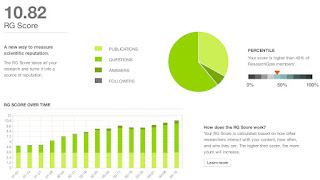Researchgate
This is a social networking site for researchers to share papers, and probably it most interesting feature though is to ask and answer questions. It is free; you get a profile page; place for posting your papers, datasets, etc.
My favourite feature is you can add questions to your papers. What I mean by that is you can post discussion questions about your paper, people often respond to them - for one question so far there have been over 65 replies/answers (admittedly some other questions have had no replies).
You can track how many papers have been downloaded and your top three downloads in the last week.
How many people have viewed you profile in the last week?
In some respects, whilst it is free, why wouldn't you put some of your papers on it (I know time). The question posing is a great feature, the discussion when they happen can be really interesting (especially when you get an answer). There is also the potential for finding a collaborator.
I certainly thinking any science doctoral student or early career researcher should give this serious consideration, even if all they do is post their papers (if copyright issues allow).
Academia.edu
can post papers, teaching materials, links
- really good for getting Google hits
- the range disciplines of people who follow your work is actually very diverse. Is often from when you start using it.
- quite well established
-it has analytics features about where someone has googled one of your papers and the keywords used.
Scoop.it
Not officially an academic social
networking tool but a bookmarking tool, in a lot of respects it does have
social networking elements that are suitable (and used by academics).
- following certain peoples posts
-commenting on what is posted
-others following you.
1. Scoopit(http://www.scoop.it)
Two examples sites used in my teaching are shown here:
artificial intelligence for studentsTwo examples sites used in my teaching are shown here:
Robot resource
The good feature of scoop.its is you have control over what content you present, you are the filter. Content suggestions are also made, but it is up to you if you select them. The aim is to increase the amount of student suggested content.












